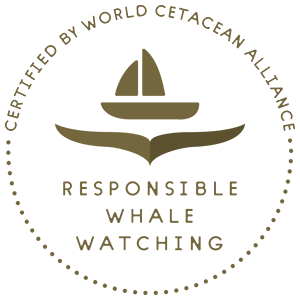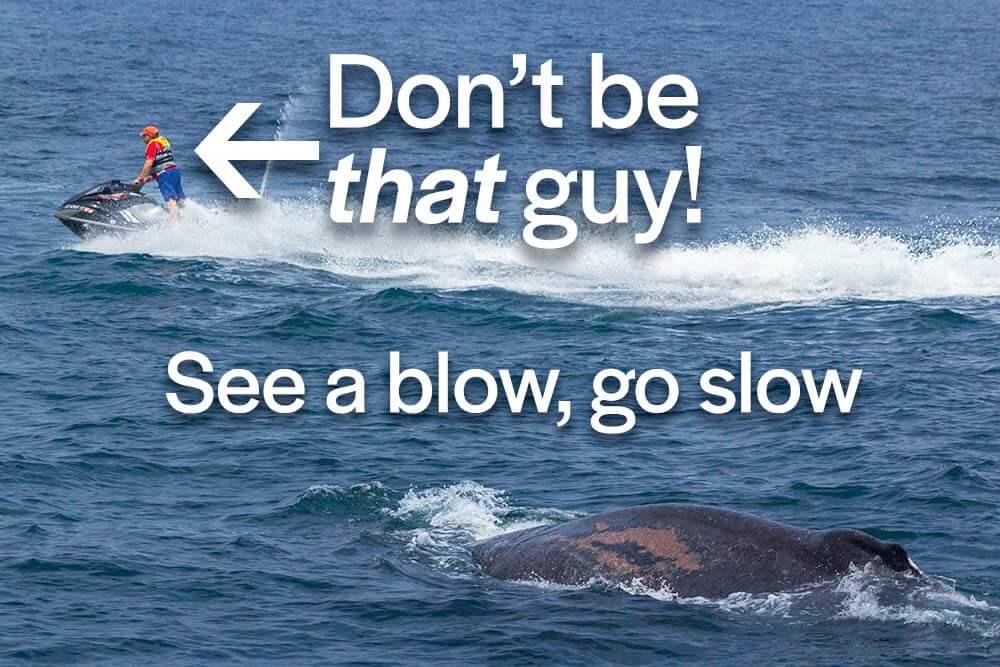Is Whale Watching Ethical?

The question “is whale watching ethical?” is a big one and extremely important to break down and discuss, because anytime anyone is out on the water, we are ALL visitors to the plentiful marine life living within our world’s stunning oceans and seas. Responsible whale watching in places like Dana Point, California, the Dolphin and Whale Watching Capital of the World®, defines this region of the globe. Just last year, the ocean area off the coast of Dana Point was named the first-ever Whale Heritage Site in the Americas.
Plentiful food sources right here in our nutrient-rich waters supply large quantities of daily food intake for large mammals such as blue whales, fin whales, humpback whales, dolphins, sea lions, and more. As stewards of this region, we can watch whales all year round. Personal recreation vessels are out on the water every single day too. Whale watching is certainly something you are likely to do (whether you intend to or not) living and boating in Southern California! Regardless of where you are in the world, and whether you own your vessel or you are joining us on a magical tour aboard one of Capt. Dave’s Dolphin and Whale Watching Safari tours for a fabulous few hours of fun in the California sun, responsible whale watching means a lot more than not just interrupting the natural behaviors of the animals you are observing.
When thinking about the ethics of whale watching, we should start with the basics:
Who?
What?
Where?
When?
and Why?
WHO practices responsible whale watching?
While getting that Instagram-worthy picture may be on your bucket list, snapping amazing pictures of whales and dolphins isn’t the only thing that is important when whale watching. These gorgeous animals are a sight to see and the desire to share their beauty is inherent, but making sure you book a trip with a company that cares more about the animals than just getting a great picture is essential. Since whales do not speak the languages we speak, they do have the ability to communicate to us through various motions and gestures. Reading the signs is vital to a whale’s survival.
WHAT is ethical whale watching?
Minimizing the negative impact on cetaceans is our priority. We NEVER put an animal in harm’s way. It is imperative to place any animal’s well-being at the top of your priority list whenever you find yourself having a ‘whaley‘ great experience with whales and dolphins (or any other cetacean or animal for that matter). Our ethical captains always remain a safe distance from the animals, ensuring that we respect legal state and global guidelines at all times, for all cetaceans. Whales and dolphins and other cetaceans should never be approached at high speeds, as it causes stress to the animal. If a whale is sighted, your captain and crew will maneuver the boat to closer proximity to a whale’s path making sure to NEVER cross directly in front of the animal.
The question “is whale watching ethical” from a boating perspective is heavily reliant on how propellers threaten whales and dolphins. While toothed whales all can use echolocation to communicate, they can still become confused if amateur drivers come in the way of their paths. Their sonar waves bounce off of objects providing an ultrasound-like picture of the exact location of where objects are in the water. Unknowingly, when boaters zig and zag through the water, it can cause toothed whales to swiftly swim through the water at high speeds of up to 45 mph depending on the species, creating what could be a potentially dangerous situation.
Responsible whale watching is not the place for stunt driving or S-shaped pattern formations which can essentially confuse a dolphin pod. This unpredictable style of driving and movement of the boat can also cause dolphins to become directionally confused and increases the chances of dolphins swimming too close to underwater propellers or “props”. When this happens whales are unable to avoid the razor-sharp blades that can come into contact with precious dorsal fins.
Is whale watching ethical if you are hurting animals? Absolutely NOT! All whales require air from the surface to breathe. While this is what gives us the great opportunity to see these beauties up close, a dolphin’s dorsal fin maintains a dolphin’s vertical position in the water, allowing them to properly breathe surface air. Damage to this fin can lead to detrimental impact and even death if it undergoes too much trauma to this part of their body as they will not be able to maintain the proper position to breathe.
WHERE is ethical whale watching taking place?
Well, one thing we know for certain is that responsible whale watching is happening at Captain Dave’s Whale Watching in Dana Point, CA, and we are hopeful that other whale watching communities across the globe are respecting the rules and national guidelines too. In the USA, if you find yourself visiting top places to see whales on the West Coast like Hawaii, Alaska, Washington, be sure to choose a company that cares about the well-being of whales more than just getting a great pic for the gram. Be sure to choose companies that are active and respected in the community in which they reside. These organizations will often have a philanthropic mission and give back to other charitable organizations. Ideally, you want to go with a company that is walking the walk, not just talking the talk. Something you can look for is a Certification from a respected organization such as the World Cetacean Alliance (WCA) who has a strict code of conduct and annual audits. Capt. Dave’s is proud to be a holder of the WCA’s Responsible Whale Watching certificate.

WHEN is whale watching ethical versus unethical?
Boats by themselves observing whales in their normal day-to-day activity is considered ethical. When multiple boats follow whales all day long gaining the attention of more and more boaters, that is when observation can lead to harassment. Multiple boats surrounding a whale can create unwanted stress for the animal and potentially could lead to disrupted breathing patterns, trauma, and potentially depleted food sources due to the sound of loud motors and engines.
Scientists and researchers, captains, and crews have been able to interpret unique movements and behaviors as forms of a whale’s communication to us. Dolphins typically love to ride the pressure of the bow and wake of the stern. We love it when this happens, but there is an art to seeing if they are in a playful space or prefer to be left alone.
Whale watching is ethical when we know when we are accepted into the pod. They invite us in, not the other way around and when they do, they come to us. This is their way of saying “Welcome! It’s great to ‘sea’ you; we are interested in you, too!”
Although dolphins love to perform this behavior, there are times when they are not interested in a playdate per se. Responsible whale watching captains and crews will notice the dolphin’s behavior and if they swim away from the boat, that lets us know that now is not a good time for them. It is also possible that during these times they could be feeding, teaching their young a new behavior, or just prefer to do their own thing. Identifying this behavior gives captains more insight into the most ethical ways to observe cetaceans during these moments.
Unlike dolphins who travel in large groups, large baleen whales prefer to take the roads less traveled, oftentimes traveling alone, in pairs, or very small groups of just a select few individuals. Typically they will not travel within these smaller groups for long periods and will return to lone travel once more. Keeping a safe distance from these beauties allows these gentle giants to feed normally in a stress-free environment. Since we commonly see six of the ten rorqual species, our team at Capt. Dave’s Dolphin and Whale Watching Safari have become experts on their movement. Some whales like humpbacks who can reach over 60 feet in length will lunge out of the water swallowing food from great depths, unaware of you even there. Responsible whale watching means keeping boats and passengers (and swimmers too) away not only for their safety but for yours too!
HOW is whale watching ethical
If we do not take the time to read the signs, it is no longer a question of “is whale watching ethical,” but more of a question of “is whale watching legal?” The Marine Mammal Protection Act (MMPA) of 1972 protects all cetaceans by prohibiting the “take” of marine mammals. That includes harassing, hunting, capturing, collecting, or killing marine mammals. To prevent harassment, which includes any disruption of their natural behaviors, NOAA Fisheries suggests maintaining a distance of at least 100 yards from whales, dolphins, and other cetaceans. Local and federal species-specific laws may vary by location. The MMPA protects these incredible creatures and keeps the animals safe and will hopefully equate to these amazing creatures being abundant in oceans for years to come.
Capt. Dave’s is a qualified and responsible, eco-friendly whale watching and dolphin observing tour! Sustainable whale watching is our priority and that’s why we ALWAYS make sure that we take every measure possible to ensure we do not disrupt the natural movement of any animal in any way. Many amateur boaters see dolphins on the water and are immediately enthusiastic to drive in their direction. Amateur boaters pose larger threats to wildlife because many times they are not aware of best practices when getting closer for a better view. If you see a blow, go slow!

Responsible whale watching is more than just seeing the animals in the sea. Viewing animals also includes taking the time to pick up what you see out on the water. Balloons can be dangerous to marine life, as many fish and dolphins may see a deflated and faded Mylar balloon and mistake it for a favorite food source – jellyfish. When ingested, Mylar balloons can not only suffocate the animal but also cause blockage in the stomach lining eventually leading to malnourishment of the animal and oftentimes death. Cleaning up the ocean with a boating “grab hook” is whale watching ethics, 101.

WHY is whale watching ethical AND educational?
Nothing compares to seeing magnificent sea creatures in their natural, wild, and free environment. Housing aquatic animals in large-scale aquatic tanks and aquariums are not only harmful to the animals themselves but are also brutal on the families they are essentially stolen from. In the wild, dolphins can swim anywhere from 50 to100 miles a day. When you see an animal in an aquatic park you are merely seeing who that animal is in the moment. What you are not seeing is the way they were taken from the wild (watch The Cove) and how many of the animals who were captured did not survive or were killed for their meat) the family they came from. What you can’t see is the mother and sisters and brothers and children that make up the family of hundreds of individuals they will stay with for the duration of their entire lives. You will never see how they work together to hunt for food or how they ensure that everyone in their pod receives the same amount of food. You will also never know how they protect each other from harm and how they band together to scare off predators hunting their young. In the wild, dolphins can live up to 45 years depending on the species. Orcas, more commonly called killer whales and largest of the toothed whale family, have been recorded living up to 90 years before taking their last breath. The lifespan of dolphins and killer whales decreases exponentially when living in aquatic marine parks and zoos.
While we do not condone large-scale aquatic tanks, we do gain a massive amount of research from establishments like SeaWorld. Many whale entanglements from fishing lines and buoys cannot be completed without the help of SeaWorld employees utilizing their experienced background in working near these majestic animals. Their services are irreplaceable, but we do advise that you opt for a sea experience that allows you to witness these animals in the environment they require – and where they belong….in the ocean. Marine science depends on research taken from observing these animals in the wild. When done respectfully and responsibly, we are hopeful we can learn more and more, and that our science helps these animals to have a safe home in oceans, everywhere.
So if it is not in a marine park, where is whale watching ethical? The only answer is in the open ocean, where they will always have the opportunity to continue to live wild and free.
Until then,
Jess Wright
First Mate and Marine Naturalist
Capt. Dave’s Dolphin & Whale Watching Safari
